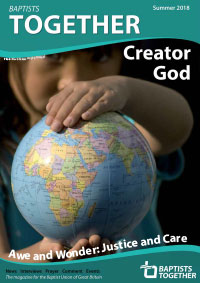What difference can I make?
Creation care can seem overwhelming. Izzy Sibley recounts how she progressed from being concerned for God’s creation to concerted environmental action – and the impact on her Baptist church

When it comes to talking about the ‘green issue’ quite often you receive one of two responses. The first is a positive, “I’m going to take this on board and try to make a change”. The second, and, most common response is, “this issue is huge and I am just one individual. What difference can I make?”
This was also my initial response. So what changed?
My journey very much began in my final year of university where I studied Geography but specialised in Climate Change and Society. During this time not only did I learn the devastating facts about the current state of our planet, but I also studied the public’s response to it; the psychology behind why people may choose to react or not react when hearing about the critical situation our climate is in. This then inspired me to write my undergraduate dissertation on a similar topic; ‘In what ways does the Christian faith affect their views on climate change and the daily environmental choices they make’. As I was studying, it occurred to me how much my faith was linked to looking after the environment. I believed the Lord created the planet and gave it to us to steward and shepherd and yet, despite growing up in a Christian home and attending church my whole life, it was not something I had ever heard being preached about or discussed in the Christian community.
So, as I began to interview people, hand out questionnaires and hold focus groups with members of the local churches around my home town, Lyme Regis. I was able to build up a picture and see if my experience was unique.
Sadly, I discovered, it was not.
The general result was, yes, participants believed it was important to look after the planet due to God’s command in Genesis to shepherd it. However, this did not motivate them into any concerted environmental action.
Discouraged, but more determined than ever, I returned home to Lyme after graduating, and introduced the newly launched
Eco Church programme by A Rocha to
Lyme Regis Baptist Church. This fantastic scheme allowed us to examine how environmentally minded we were in three areas of our church life; the spiritual, missional and practical. With an extremely supportive church family we set to it. Among other things, we switched our energy provider to an eco friendly one, we swapped our cleaning products to plant based, chemical free brands and held clothes swaps for our local community to encourage the recycling of clothes.
However, although this practical action was good, and helped us make a lot of progress, the most important aspect for us was spiritual. It was all very well and good making these practical changes, but if Jesus (Christ-likness) wasn’t our motivation behind it, then we were just like any other secular group. So we delved into scripture during Sunday mornings and in our house groups. We really began to understand how much looking after the planet is linked to the gospel and being more like Jesus.
Colossians chapter one proclaims:
‘The Son is the image of the invisible God, the firstborn over all creation. For in him all things were created: things in heaven and on earth, visible and invisible, whether thrones or powers or rulers or authorities; all things have been created through him and for him. He is before all things, and in him all things hold together.’
Here we are told that ‘all things’ are created through our Lord, for him and by him. So why would we not want to take care of the planet, which, according to Genesis has not only been given to us as a gift, but has been created through, by and for our saviour?
Christian environmentalist Jonathan Moo states:
"How can we in reality love God with all of our being if we do no value what he loves and values and do not care for the creation that belongs to him?"
Another piece of scripture that really was a turning point for our church family was Mark chapter 12 where we are taught by Jesus to love our neighbours. It is now clear from scientific evidence that our affluent lifestyles here in the west are negatively affecting climates across the world. With our excessive burning of fossil fuels and consumer driven society we are causing harm to those in countries that don’t have the means to mitigate or adapt. One reason we’re so slow to take up environmental action in the UK is the fact we aren’t feeling the initial impacts of climate change; for us it is a distant problem that isn’t obviously affecting us. Nevertheless, Jan Egeland, former UN under secretary General for humanitarian affairs states:
"Climate change- it is happening, and today affecting those who suffer the most. You only need to visit countries like Africa to see the devastation that is already occurring through drought and flood."
Are we, as disciples of Christ, loving our neighbours as Jesus commanded, by making sure our lifestyles have no detrimental impact on our neighbours across the world? It is certainly a challenge but one we can rise to.
Two years on from writing my first dissertation I found myself writing another dissertation for the Christian Rural and Environmental Studies certificate course with the John Ray Initiative. I decided to base this study on Lyme Regis Baptist Church, asking the same questions as my first dissertation to see what progress we had made since introducing the Eco Church project.
The results of this second piece were incredibly encouraging. Not only had we achieved our bronze and then silver Eco Church award, but people had really begun to link their faith to taking care of the environment. They had really understood how much Kingdom living involved being a shepherd of Creation and had begun to implement it in their homes.
So, I return to the question raised at the beginning of this article; “How can we make a difference, when climate change is so huge?" Our planet is now past the point of no return. We are destroying our shorelines and seas with plastic, tearing down rainforests, and polluting our land with chemicals. Despite this, we can make a difference, and it starts with the relatively small actions individuals can take in their homes and churches.
For example, switching to green energy providers (which takes all of 20 minutes), cutting down on plastic packaging, switching light bulbs to LEDS and being conscious of food air miles. Small, simple things when done by enough people can snowball into a big change! Consider if every Baptist church in the UK became an
Eco Church, what a difference that would make!
Finally, one of the most vital areas of becoming more environmentally conscious as disciples of Christ is the missional opportunities it brings. It is our responsibility as Christians to take a stand against injustice and unethical practice. This is a chance to not only show our local communities that we are up to date and positively active on current issues but, what an opportunity to witness and bring people to Christ through doing it! What an opportunity to show the love of Jesus through taking care of and showing love for our planet…
‘Our cautious response to these issues in the face of mounting evidence may be seen by the world as uncaring, reckless and ill informed. We can do better. To abandon these issues to the secular world is to shrink from our responsibility to be salt and light. The time for timidity regarding God’s creation is no more.’ - Southern Baptist Declaration on the environment and climate change.
Image | Ben White | Unsplash
Izzy Sibley works for two local churches in her area of West Dorset and East Devon, helping them in their Eco Church journey. Izzy is passionate about her faith and looking after the environment.
 This article appears in the Summer 2018 edition of Baptists Together magazine.
This article appears in the Summer 2018 edition of Baptists Together magazine.
Baptist Times, 03/05/2018